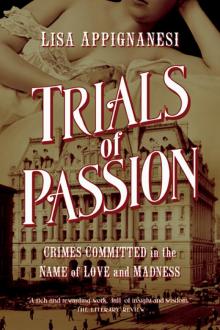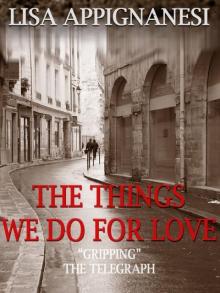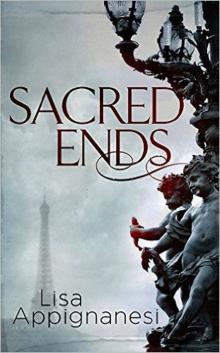- Home
- Lisa Appignanesi
Memory and Desire
Memory and Desire Read online
PRAISE FOR LISA APPIGNANESI
‘A rich, epic novel… A superbly plotted saga of passion and heartbreak. Appignanesi will keep you guessing until the last full stop.’
Cosmopolitan
‘A monumental novel, intelligent and well-written.’
Sunday Times
‘A darkly erotic novel, Memory and Desire lays bare the many faces of a modern Eve… An absorbing story of sexual compulsion and emotional obsession, it continued to haunt me long after the last page was turned.’
Sally Beauman
‘An erotic and deeply intelligent novel.’
Rosie Thomas
‘As subtle as it is thought-provoking…reminiscent, in some elusive way, of Willian Styron’s Sophie’s Choice.’
Chicago Tribune
‘Emotional, Freudian…fascinating.’
Booklist
Memory and Desire
Lisa Appignanesi
Paris: 1934. Psychoanalyst Dr. Jacob Jardine strolls through a bustling marketplace and glimpses Sylvie, the tantalizing embodiment of all his deeplest imaginings…
New York: 1980, Film Director Alexei Gismondi follows a beautiful woman through Manhattan’s Upper East Side. He has come from Rome to unravel the thirty-five-year mystery that obsesses him and he believes Sylvie’s daughter holds the key…
Deeply intelligent, utterly compelling, this novel probes the secrets of heart and mind forged in war and migrations.
© Lisa Appignanesi 1991
First published by Harper Collins UK
Other Books by Lisa Appignanesi
Novels
__________
Dreams of Innocence
A Good Woman
The Things We Do for Love
The Dead of Winter
Sanctuary
Paris Requiem
Unholy Loves
Kicking Fifty
The Memory Man
Non-Fiction
__________
All About Love: Anatomy of an Unruly Emotion
Mad, Bad and Sad: A History of Women and the Mind Doctors from 1800
Freudd’s Women (with John Forrester)
Losing the Dead
Simone de Beauvoir
The Cabaret
Femininity and the Creative Imagination: Proust, James and Musil
Edited Volumes
__________
Free Expression is No Offence
The Rushdie File (with Sarah Maitland)
Dismantling Truth (with Hilary Lawson)
Postmodernism
Ideas from France: The Legacy of French Theory
For John
Who does
Memory is the past tense of desire.
-Wilfred Bion, 1967
∞
Contents
Copyright
PART ONE
Chapter One
PART TWO
Chapter Two
Chapter Three
Chapter Four
Chapter Five
Chapter Six
Chapter Seven
Chapter Eight
Chapter Nine
Chapter Ten
Chapter Eleven
PART THREE
Chapter Twelve
Chapter Thirteen
Chapter Fourteen
Chapter Fifteen
Chapter Sixteen
Chapter Seventeen
Chapter Eighteen
Chapter Nineteen
Chapter Twenty
Chapter Twenty-One
Chapter Twenty-Two
Chapter Twenty-Three
PART FOUR
Chapter Twenty-Four
Chapter Twenty-Five
Chapter Twenty-Six
About the Author
PART ONE
∞
Chapter
One
__________
∞
There is nothing quite like spying to feed the erotic imagination.
Seeing and not being seen, gazing upon what thinks itself unobserved, trembling on the brink of the secret. Hazarding discovery.
Alexei Gismondi, as he trailed through the wet Manhattan streets on a day in early spring was not unaware of the links between spy and lover. And he had watched too many B-movies in his youth for his reflection amidst the bric a brac in a boutique window not to bring a smile to his lips. There it was, the soft slouch to his hat. The light belted coat which kept the persistent drizzle from his shoulders. He had unthinkingly dressed for the part.
For a moment the irony of his situation dispersed the grimness of his mood. Not a sleuth, yet for the last four days he had been assiduously shadowing one particular woman.
And the cast she had taken on in his imagination did not altogether please him. He had not come to New York to indulge in a lover’s overheated fantasies.
Perhaps it was this city which was doing it to him. This Manhattan of dream and danger and celluloid. This week it seemed to him like a medieval fortress full of dark corners and crevices and secret underground passages. A perilous, moated medieval town, magnified and transported into a future present of outsize spires and tunnelled windswept canyons. A mere individual could vanish here without trace. Or a woman be snatched from the ramparts.
He moved on keeping her slender form in view. Then abruptly he stopped. She had disappeared into the porticoed depths of a restaurant. He waited a few moments and then followed her in. Cool colours, hushed voices. A little enclave of peace in the ferocity of the city. He was beginning to know her tastes.
Alexei Gismondi rid himself of his hat and coat and slipped the hostess a twenty dollar bill.
The woman looked at him curiously. Foreign. Definitely a foreigner. A determined and far-too handsome foreigner in a pale cream-coloured suit. She shrugged her shoulders imperceptibly and led him to a table no different from five others, except that it bore a reserved sign.
Except, too, that it gave him a clear view of Katherine Jardine.
Was she who he thought she might be? Was he?
Alexei leaned back in his chair, hid his restlessness, studied the menu unseeingly. Perhaps he ought to stop this farce of detective work now. That sense of vertigo which had hovered around him these last months threatened him again as he looked at her. That feeling that the solid ground of accepted truths was crumbling into a chasm of lies. The sense that history had cheated him.
Alexei puffed once on the acrid cigarette he had lit and then stubbed it out angrily. Perhaps he should never have come on this absurd, self-indulgent journey.
And yet he was here. He had taken the plane out of Rome the moment the film was finished. When he was frank with himself, he knew that he had thought of little else but coming here to New York over the last six months. Ever since he had seen that picture in the exhibition.
How strange it all was. This power of coincidence. This power of a picture. One moment the future had seemed empty, a cold, bleak, unpeopled horizon. Nothing propelled him forward. And his memories, the past, abutted in a series of brutal dead ends. As dead and brutal as the broken body of Aldo Moro, Italy’s elder statesman shot eleven times and stuffed into the boot of a car.
Then one day he had stumbled on that face. An extraordinary portrait in an exhibition which had borne the title, Paris Between the Wars. Ranged amidst Picabia’s mechanical monsters and Dali’s surreal nightmares, that particular face had called out to him. A face that was childlike in its innocence, yet rampantly seductive. Troubled, too, as it sat atop the owlish feathers of a bird’s body. The caption to the picture read: ‘Portrait of Sylvie Kowalska’. Collection - Katherine Jardine (New York).’
He had stared at the image for a long time. It moved him, drew him on. He had pondered the name. Rem
embered. It had been signatory to a letter he had received over ten years ago. A bizarre letter. There had also been a ring.
He returned to look at the picture every day for the length of the exhibition. The face of Sylvie Kowalska, vital, alive, mysterious, possessed him. And standing, gazing at that haunting image, Alexei had been filled with a rush of curiosity and excitement of an intensity he had not experienced since Rosa had died.
‘Are you ready to order, Sir?’
Alexei heard the hint of impatience in the waiter’s voice which signalled that the question had already been asked a number of times. He named the first items on the menu his eyes lit on.
When he looked up he met Katherine Jardine’s eyes for the first time. The directness of the contact was like a shock. Her eyes bore a trace of wry amusement. But it vanished as soon as he returned her gaze. Her expression then settled into that cool unblinking remoteness which he already recognized.
It was thus that he had first seen her through the glass of her Gallery window. A slender, graceful woman with arresting grey eyes beneath a luxuriant sweep of dark burnished hair. She was standing completely still, yet watchful amidst that hive of activity which was the mounting of a new exhibition. Assistants were placing canvasses large and small up on the gallery walls waiting for her authoritative nod before completing their task. He recognized her from the photograph the agency he had hired had sent him. But seeing her in the flesh was an experience he had not sufficiently prepared himself for. She was beautiful, far more beautiful than Rosa. And she intrigued him, troubled him. That cool, musing poise which distinctly whispered, don’t touch. And then, the sensuality of those wide lips, the wildness behind the eyes.
Alexei laughed at the direction of his thoughts. In another life, he might have trailed her, shadowed her movements for a far different purpose. Even now he wondered what he would have done had Katherine Jardine turned out to be a portly substantial woman of middle years.
He had left Rome with the sense that he was on an urgent mission. Revelations had to be made. Truths uncovered. But in these last days in New York he had grown less sure. Perhaps his earlier certainty had merely been the fruit of need. The result of an obsession which had found the facts to sustain its existence. The face of Sylvie Kowalska had propelled him on a voyage of discovery, a search for a different history which would endow him with a new future.
And if he revealed all this to Katherine Jardine, might she not simply turn those cool grey eyes on him and see him as a burnt-out case in pursuit of the lives he might have led?
She had been joined now by an older man with thickly curling white hair. He kissed her on both cheeks in continental fashion. She smiled a warm slow smile, accepted apologies for lateness. Alexei watched entranced. He could only see the man’s back. Was he a friend? A lover? The thought disconcertingly distressed him. There was no husband. That much he had ascertained.
He listened intently, trying to distinguish their low voices from those of the diners now interposed between them.
Suddenly he saw her face cloud over, the grey eyes grow dark. Her voice now was distinct.
‘No I will not go to Italy. I will not set foot there again.’
She was speaking French. He could only make out a phrase or two of what her partner said.
‘But you must, Katherine… Think of the damage…’
He thought she might cry. How vulnerable she suddenly looked. He felt like shaking the man.
Then she met Alexei’s eyes again. This time he read a note of suspicion in them. Hastily he called for his bill. It would spoil everything if he was found out. He pulled his hat low over his brow.
Soon. Soon, he would make direct contact. But he had learned something today. With Katherine, he sensed he would have to move slowly, by indirection, if he were to learn more about her. And more about Sylvie Kowalska, that unknown woman who had obsessed him over the past months.
Meanwhile there was his next appointment.
With a wayward backward glance at Katherine, Alexei made his way out into the damp streets. The drizzle had hardened into rain, large drops of it, gathering and swirling in the gutters. On Madison Avenue, people hurtled by, their umbrellas a rainbow of mushrooms beneath the towering forest of the city.
Alexei took his time. He had over half an hour to cover the short distance to the Park Avenue address. Ample space in which to stroll by her house again. There it was. A gracious brownstone squeezed by the giant presence of its neighbours. Crocuses jutted purple and white from an ivy strewn windowbox. Inside a light glowed making plain the shining surface of a baby grand, a panoply of canvases on the wall. He was tempted to ring the bell, find an excuse, go in, examine, touch, sniff.
No. It would have to wait.
At the corner of the street, an old man, huddled against a building’s concrete, stretched out a begging hand. On closer inspection, Alexei saw that the stoop, the grey face, had nothing to do with age. He pulled out a wad of bills and placed them in the shaking hand. Money. That wasn’t his particular lack.
He turned the corner into Park Avenue and then hastened his steps. He mustn’t be late. The appointment had been set up for him by a friend weeks ago. Famous psychoanalysts like Dr. Jacob Jardine were not instantly at one’s beck and call.
Alexei announced himself to the porter, made his way over thickly carpeted floors to the lift. The doors were about to close when a man came rushing in. Thickly curling white hair, erect carriage. It was the man Alexei had seen in the restaurant with Katherine. He looked away guiltily. Tried to make himself small. To no avail.
‘Sam tells me you are on your way to my office,’ the older man looked up at him with dark piercing eyes. ‘I am glad not to have kept you waiting.’ He thrust out a hand. ‘You must be Alexei Gismondi. I am Jacob Jardine.’ he chuckled as if he was caught in the midst of a joke.
Alexei hoped his surprise did not show too blatantly. The photographs on the Italian bookjackets had prepared him for a far younger man.
Jardine was sizing him up with an intelligence born of years of quick assessments. Alexei, discomfited, mumbled something banal about the weather.
‘This way.’ The older man ushered him into an outer office. ‘Mrs Frampton will take your details and I shall be with you in a moment.’
Mrs. Frampton did indeed take his details, as quickly and efficiently as Alexei’s not altogether truthful responses allowed. Then a little buzz announced Dr. Jardine’s readiness and Alexei was shown into a large airy room complete with the requisite couch, the works of Freud in a variety of languages and a splendid array of tomes amongst which he would happily have browsed. All this he took in at a glance before Dr. Jardine gestured him towards a comfortable chair positioned in front of a mahogany desk on which a number of antique figurines kept guard.
‘Of what use can I be to you, Mr. Gismondi?’ The older man placed a pair of spectacles on his nose and leaned back comfortably in his chair.
Alexei was aware of the French lilt to his speech.
‘I had hoped you might be able to advise me on an analyst. I wish to begin an analysis. I have even hoped it might be with you.’ Alexei said, hearing the words reverberate strangely in his own ears.
‘You wish. To begin.’ Jardine took him up on his words, stressed them so that they acquired a new significance. ‘Do I take it then that you have not been driven here out of need, but by a whim? And that a beginning is perhaps all there might be? Analysis is not a pleasurable excursion, Mr. Gismondi, like a weekend trip to Paris, or like a brief tantalizing encounter with a beautiful woman.’ He chuckled again and looked at Alexei amiably. But it did not take the sting out of his words.
‘My English may be at fault, Dr. Jardine. Wish in Italian is a very strong word.’ Alexei defended himself. He shifted in his chair. He would have to be on his guard with this man.
‘Ah yes, of course. It is not your language. But then why do an analysis here in a foreign tongue. Tell me honestly, Mr. Gismondi. What brings you to
analysis? On first judgment, I see nothing that tells me that you are not what you seem: a man in your prime.’
The dark eyes bore into him.
It was Alexei’s turn to laugh and he did so with sardonic zest.
‘What brings me to analysis is the small question of my mother. My mothers.’ He was pleased to find himself honest at last.
‘Now that interests me.’ Dr. Jardine scrutinized him closely. ‘Your mothers, you say?’
‘Yes. They have given me a deep and abiding sense of unreality. Nothing I touch anymore seems to be real, have any meaning.’
‘Ah meaning. Mr. Gismondi. We can deal with sex. We can deal with fear. We may even be able to deal with death. But meaning… I think you would be better served by a priest or a philosopher.’
Alexei found himself angry. ‘And you Dr. Jardine, why did you go into analysis. Was it because you were impotent? Or afraid of your own shadow?’
Dark eyes twinkled at him. ‘You are quite right of course. I plead guilty to intellectual curiosity. But then Mr. Gismondi, I was training. I was already a psychiatrist. But we’re not here to talk about me. Tell me, have you ever seen someone suffering from the many states we now loosely place under the categories of paranoia or schizophrenia or depression?’
Alexei nodded briefly.
‘Then you will not tell me that you, as I see you here before me, are suffering from anything more than what Freud would have called ‘ordinary everyday unhappiness’. And that, after all, is our common lot.’
‘So you won’t help me?’ Alexei surprised himself by his persistence.
Jacob Jardine shrugged. ‘If you wish to squander your money in order to satisfy your intellectual curiosity and to gaze in the presence of another into the navel of your memories and desires, I shall certainly not stop you.’ He scribbled a few lines on a piece of paper and handed it to Alexei. ‘I myself am now an old man and take on very few patients.’

 Memory and Desire
Memory and Desire The Dead of Winter
The Dead of Winter Trials of Passion
Trials of Passion Dreams of Innocence
Dreams of Innocence All About Love: Anatomy of an Unruly Emotion
All About Love: Anatomy of an Unruly Emotion The Things We Do For Love
The Things We Do For Love The Memory Man
The Memory Man Mad, Bad, and Sad: A History of Women and the Mind Doctors
Mad, Bad, and Sad: A History of Women and the Mind Doctors Sacred Ends
Sacred Ends Paris Requiem
Paris Requiem Sanctuary
Sanctuary A Good Woman
A Good Woman